I climbed the iron gate to the church to apply a much-needed coat of paint. It was hot and the project required me to hold an awkward position. The strangest part was the dirt street full of spectators. I had a following wherever I went. I am tall and white and the Upper Egyptian village I was visiting was not used to seeing foreigners. Kids crowded around saying, “sura, sura”. It means “picture”. I went there as a missionary. I was there to serve. And I did. But that is not all that happened. They also served me. They welcomed me, no, urged me into their homes where they showered me with hospitality. I had a schedule of homes to visit that I could never complete. I would sit in their primitive homes as a guest of honor while they brought out large amounts of amazing food. I learned that I had to be careful in my comments because if I let them know that I liked something of theirs, they gave it to me. They hugged me and squeezed my hand. They smiled and enjoyed my presence in a way that made me feel important, like I was bringing value to their life. I was the “missionary”. But really, who blessed who? The blessing was mutual. I left that village feeling that I received far more than I gave.
The Bible is the story of covenant and renewed covenant. God made a covenant with Abraham. We are spiritual descendants of that covenant. That covenant calls us to a simple mission. Here it is…
Genesis 12:1-3
Now the Lord said to Abram, “Go from your country and your kindred and your father’s house to the land that I will show you. And I will make of you a great nation, and I will bless you and make your name great, so that you will be a blessing. I will bless those who bless you, and him who dishonors you I will curse, and in you all the families of the earth shall be blessed.”

First, notice who the primary doer is. God says, “I will make…”, I will bless”, “I will curse…” He has some doing for us, but he initiates it all.
Second, notice the primary action to be done. A form of the word “bless” is used 5 times in two verses (vv. 2-3).
Third, notice the flow of the blessing. The blessing comes from God to people then it flows through people to others. God’s blessings come to us for others and to us through others.
God could have designed us to be isolated individuals, but he didn’t. He made us for relational living in mutual blessing!
Implication of Mutual Blessing: The call to mutual blessing has implications on how we live our lives.
IMPLICATION 1: YOU CAN BLESS OTHER PEOPLE!
The call is clear and repeated in Scripture, “through you all nations of the earth will be blessed.” (Genesis 12:3; 18:18; 22:18; Acts 3:25).
What does it mean to “bless”? One of the responses to the Send Me Survey said, “I don’t relate well to the word ‘bless’.” It is a bit religiousy. The Hebrew word “barak” is the one used all five times in Genesis 12:2-3. It is simply translated “bless”. Maybe we would do better to think of it as not living to hoard the good but looking for opportunity to direct the good to others. It is service. It is other-centered love. It is relational living. Find a term for it that you can live with because it is how we are called to live.
God intends to use you to extend his blessing to other people. You might be the only sermon some people will hear, the only church service they will attend, bible study they will have.
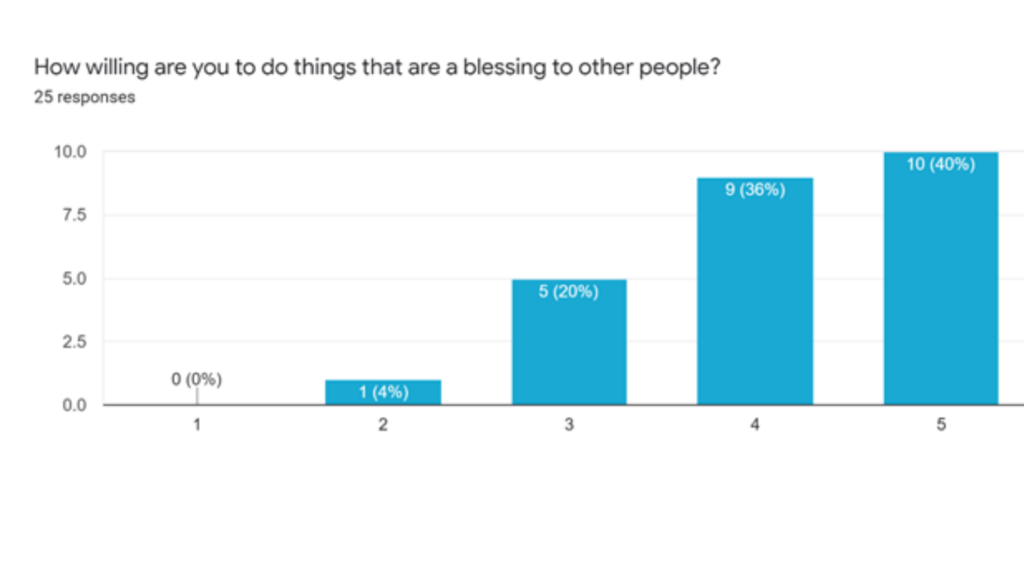
Here is what the Send Me Survey responses have to say about blessing others. The survey asked, “What are some examples of things you do to bless other people?”
Responses: use my car to give rides, share music, babysitting, Bible studies, spend time, invite people to church or small gatherings, introduce people, give out literature, fill people’s needs, give my testimony, guide, listen, pray, prison ministries, encourage, share food, moving help, home repair, show God to children, good work ethic, remove snow, buy groceries, live positive, affirmation, being kind, build bunk beds, Vacation Bible School, send encouraging messages, share the beauty of AK with my friends on Facebook, and I don’t run around with a scorecard in my pocket to tally whom I blessed today.
That is awesome! It is just a condensed list of things that 25 people from the Palmer SDA Church community are doing. Keep it up!
There are two common lies that can keep us from blessing others. Let’s expose them!
- Lie 1: I am not able to bless.
- Lie 2: They are not worthy of blessing.
To believe that we are not able to bless is not humility, it is a denial of the power of God to bless through us. To believe that someone is not worthy is not discernment, it is a denial of the will of God to extend his blessing to all people. Our prejudices limit the blessing.
The call to mutual blessing is for the individual and the church. We, as a church, should be a blessing to the community around us. As Pastor Shawn Brace says, “When designing a vision for our churches we ought not to ask where our churches will be in 10 years, instead we should ask, where will our community be in 10 years because we are here?”
IMPLICATION #2: OTHER PEOPLE CAN BLESS YOU.
Genesis 12:3 “I will bless those who bless you…”
Genesis 14:18-19 And Melchizedek king of Salem brought out bread and wine. (He was priest of God Most High.) And he blessed him and said, “Blessed be Abram by God Most High…”
Do you find it more difficult to receive than to give? One survey response said, “this is a shortcoming for me, I want people to leave me alone, that said, many bless me.” It’s a tough one for us. Another said, “Interestingly enough, sometimes it is easier for me to give, then to receive… However, in Alaska, I feel it is easier somehow for me to do both equally.” Just maybe, even with the discomfort, we are ready to be blessed!
Here is what the Send Me Survey responses have to say about blessing others.
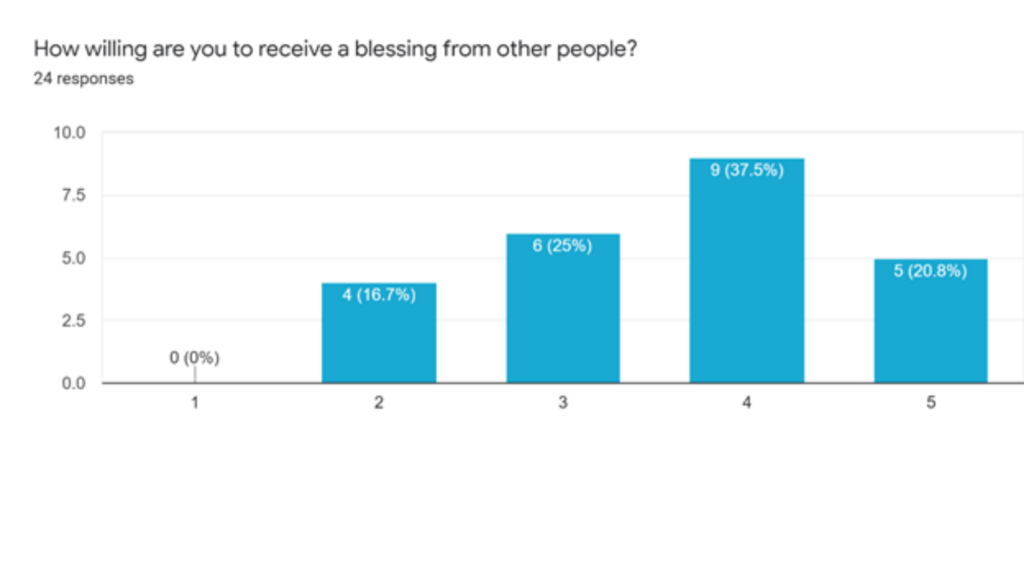
The survey asked, “How willing are you to do things that are a blessing to other people?”
Responses (similar answers to how we bless): thoughtful notes, words of affirmation, smiles, music, patience with me, thoughtfulness, meal train, text messages, spend time with me, Home Gatherings, people saying “hi” at church, people asking to sit with you at church, to mention only one thing, pray, offer friendship, watch my kids, like me for who I really am and not just what I can do for them, share experiences, teach wisdom, guidance thru life, kindness, praising the Lord, breaking bread, listen to me, give me words of affirmation, spend time with me, I have had people generously listen to a challenge I’m working through, people have been willing to give me a ride when I’ve needed one, helped me move or showed interest in my life, call me and visit not for gossip, call to check on me, invite over for meal, sometimes… they just listen to my rants…lol, I am given grace every day on my mistakes and shortcomings, participate in the worship service.
Blessing is coming at us from every direction. Here is one survey response that is particularly thought provoking, “Today I didn’t have to walk to work in the snow, I drove my pickup, in my entire life I have not done enough work to create this vehicle on my own, so I have been blessed by many people that I don’t even know just on my journey to work.” We can’t even comprehend how blessed we are by other people.
Again, there are lies that keep us from receiving blessing from others. Here are two:
- Lie 1: I am unworthy of blessing.
- Lie 2: They are not able to bless me.
In response to lie 1, remember being worthy is not a prerequisite for God’s blessing.
In response to lie 2, watch out. This is a dangerous lie.
Our prejudices are limiting our being blessed. We are missing out on blessing because we think others have nothing to offer. What if it is true that every person, being created in the image of God, can actually bless you? Do you believe that you can be blessed by the person who is not as smart as you, rich as you, old as you, young as you, religious as you, healthy as you, vegan as you, interesting as you, attractive as you, and as emotionally balanced as you?
When we refuse to be blessed by others it is not humility, or independence, or pulling your own weight, it’s arrogance, it’s prejudice, it’s delusions of superiority.
God didn’t design us to be blessing machines with high volume outputs and no input. He designed us with a need to receive from others.
We are not the heroes!
I took a class about mission. The professor, Andrew Tomkins, shared a personal experience that reveals a wrong way of thinking. He went from North America to India to serve as a missionary. He primarily taught in Adventist schools in India. When he would return to the US people would refer to him as a missionary and ask him what it was like to be a missionary. He married an Indian woman. She moved with him back to the US. She has now taught in Adventist schools for years. Nobody has ever referred to her as a missionary. Nobody has asked her what it feels like to be a missionary.
We have a superiority problem. We think that we are God’s gift to the world (no, his name is Jesus). We need to shift our thinking, “they need me” to “we need God”.
The superiority issues can creep into our religious identity. Do we really think that the non-Adventist world has nothing to offer us? Do those people, created in the image of God, have a picture of God that would be a blessing to us? Yes. We have a blessing for the world, they have a blessing for us! Just as we can be blessed by others individually, our church can be blessed by others.
The thoughts of superiority limits blessing! Do we really want to close off the flow of blessing because we think that our brain is more capable than theirs, that our lifestyle is more respectable, that our job is more important, or our title is more impressive? God has something for you that he wants to give through the person who is disabled with severe brain trauma, through the person who is paralyzed from the neck down, through the person who irritates you, through the person who is trapped in destructive habits. How much more exciting would life be if we saw all people as individuals who could truly bless us? We could look at every person we interact with and know that God has designed for us to be blessed, in some way, through them.
IMPLICATION #3: EXCLUSIVITY IS UNACCEPTABLE.
That phrase, “through you all nations of the earth will be blessed” (Genesis 12:3) presents an incredible tension. This tension became clear to me in a way I had not seen before when I read a chapter entitled, “God’s Peculiar People” from Christopher J.H. Write’s book, The Mission of God. The chapter subtitle reads, “chosen for all”. On page 223, he points to Genesis 12:3 and says, “The tension between the universality of the goal (all nations) and the particularity of the means (through you) is right there from the very beginning of Israel’s journey.”[i]
Both are there, “through you” and “all nations”. God has called us in a special way. But in calling us he is not forsaking the others. He is pursuing them.
The following survey responses reflect some healthy thinking.
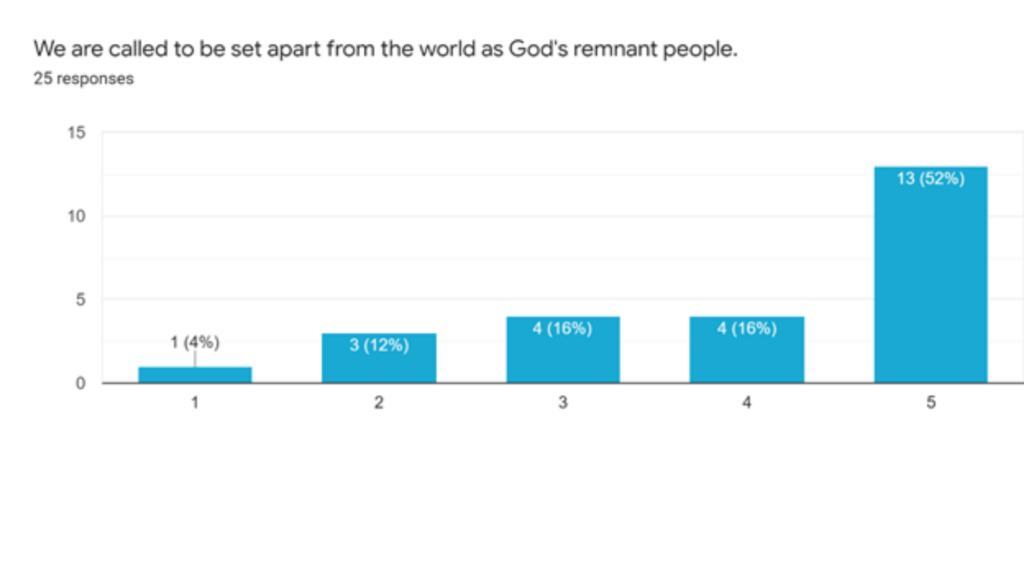
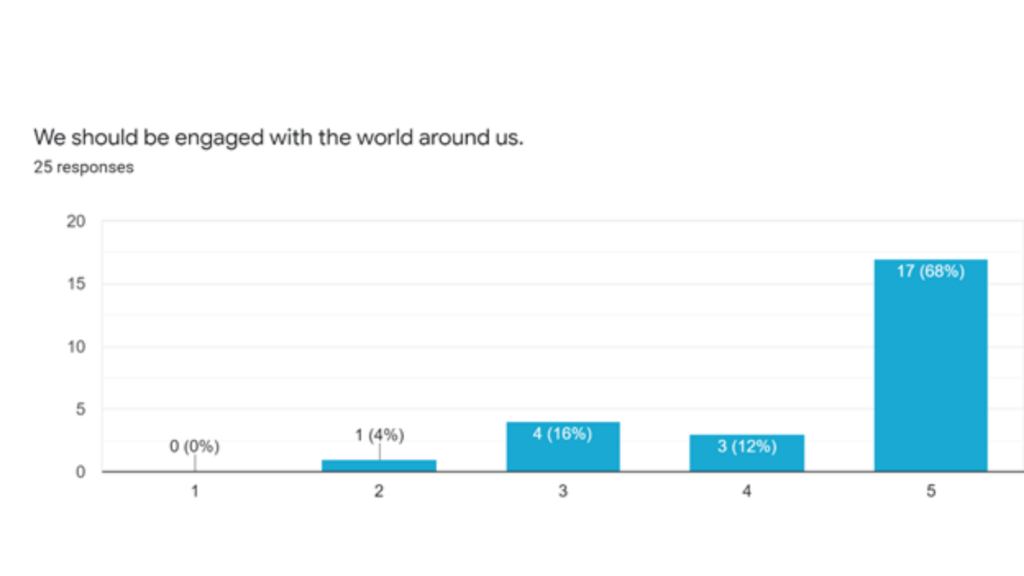
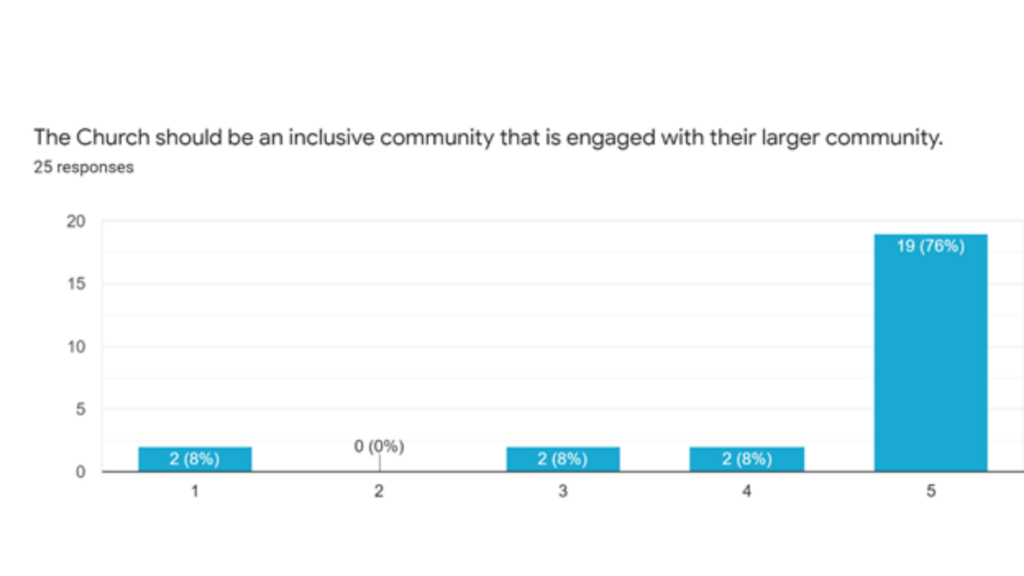
Isaiah 19:24-25
In that day Israel will be the third with Egypt and Assyria, a blessing in the midst of the earth, whom the Lord of hosts has blessed, saying, “Blessed be Egypt my people, and Assyria the work of my hands, and Israel my inheritance.”
Christopher White reflects on this verse, “The identity of Israel will be merged with that of Egypt and Assyria, such that the Abrahamic promise is not only fulfilled in them but through them…. So these foreign nations come not only to experience blessing but to be a blessing on the earth… the Abrahamic promise is a self-replicating gene. Those who received it are immediately transformed into those whose privilege and mission it is to pass on to others.”[ii]
He later quotes Lucien Legrand, “Election does not cut Israel off from the nations. It situates that people in relationship with them.”[iii]
I believe that the Seventh-Day Adventist Church has a distinct calling. I believe that we are a part of God’s worldwide remnant. This does not cut us off as superior. It positions us in relationship with the world to bless and be blessed. In the life of mutual blessing, exclusivity is unacceptable.
Implication #4: To bless is success!
When you read Genesis 12:1-3, do you notice there are some things missing in the mission God gave Abram? Is it an oversimplification? What about the teaching, preaching, baptizing, disciple making, evangelism, worship services, church planting…? Blessing is great but you can’t just go around blessing all the time. You have to follow that with real ministry, right? Unless, to bless is success.
All those other things are important, but they are a function of our call to bless. We do ministry in order to bless, not the other way around. We get this backwards. We often think we will bless (as an entering wedge) in order to then evangelize. But we should evangelize because it is a blessing to know God. The mission of blessing doesn’t do away with the great commission, it puts it in its proper context. A blessing focus doesn’t mean we don’t baptize and teach but it means that we do those things to bless people. If the truth we teach is not a blessing to them, we might need to re-evaluate. It should set them free! Every commandment of God should be an invitation into the blessing of abundant life.
Success is not only the moment when we baptize them into the church. Every moment of mutual blessing was success. Baptizing them into the church is a grand celebration of all the blessings of God that led to that moment.
If we redefine a win as mutual blessing then we would multiply our opportunities to succeed, and to celebrate. If mutual blessing is a win then we can enjoy the success of heaven in every act of service, every encouraging conversation, and moment of meaningful connection, and every step of relational living.
Kingdom is in the moment of mutual blessing! Live with an eager expectation that God will use you to bless others and that he has wonderful surprises to bless you with in other people. There is a potential blessing in every connection.
J.N Andrews and his two children were the first international Adventist missionaries sent by the General Conference. The sailed to Europe in 1874. There is a prayer known as the J.N. Andrews Benedictions. It was a farewell prayer written by Andrews and published in the Review and Herald.
This was his prayer, “And now, as we set forth, we commit ourselves to the merciful protection of God, and we especially ask the prayers of the people of God that his blessing may attend us in this sacred work.”[iv]
The legacy of Adventist mission is a continuation of the call of Abraham. Bless and be blessed!
[i] Christopher J.H. Write, The Mission of God, p. 223
[ii] Christopher J.H. Write, The Mission of God, p. 236
[iii] Lucien Legrand, Unity and Plurality: Mission in the Bible p. 14
[iv] Adventist Review and Sabbath Herald, September 22, 1874